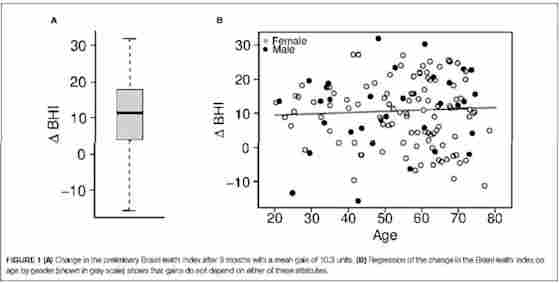Overview
This groundbreaking pilot study demonstrates the effectiveness of a personalized measure and training protocols, having the potential to revolutionize global health, with the unveiling of The BrainHealth® Project, an easy-to-use online platform that delivers a novel, science-backed approach to measuring, improving and tracking one’s own brain fitness. A key innovation of the project centers on the BrainHealth Index (BHI), based on a multidimensional definition of brain health and its upward potential. The BHI is a composite derived from a series of best-in-class assessments that explore multiple aspects of an individual’s cognitive capacity, as well as their sense of well-being, quality of social interactions and complexity of daily routines. The result is a personalized score that becomes an individual’s baseline, and in theory has no upper limit.Outcomes from this study indicate 75% of participants showed a gain of 5 or more points on their BHI, regardless of age, education or gender. All sub-domains of brain health, including stress, anxiety and resilience, contributed to these gains, although training focused largely on cognition.Brain health is often neglected in public health, limited to receiving attention only after something goes wrong. However, neuroplasticity research illustrates that preventive steps strengthen the brain's component systems. But actionable steps are needed to help the public gain awareness of the real potential to take control of your brain health, and to scale proven population-level interventions.
Figure 5. (A) Change in the preliminary BrainHealth Index after 3 months with a mean gain of 10.3 units. (B) Regression of the change in the BrainHealth Index on age by gender (shown in gray scale) shows that gains do not depend on either of these attributes.










